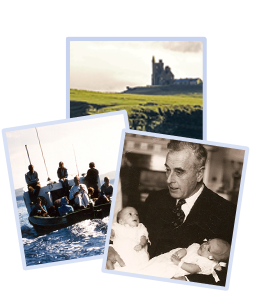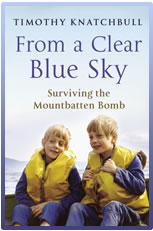Justin Webb
It is 30 years since an IRA bomb killed Lord Mountbatten. The bomb was placed in a boat. Also in that boat was Timothy Knatchbull, Lord Mountbatten’s grandson. He survived though his twin brother, his grandmother and a local teenager did not. Timothy Knatchbull now in his forties has written a book which revisits that day.
Mr Knatchbull, what do you actually remember of the day? What did you remember during your later childhood?
Timothy Knatchbull
Well it was a tremendously happy, relaxed, family holiday in the west of Ireland. And like most families that day we were enjoying ourselves. We had a big family breakfast, we went out on a beautiful flat calm sea and it seemed that everybody in the village that day, everybody who had a boat, was out and that was a very fortunate thing.
We had only gone about a quarter of a mile, half a mile or so, when there was a really dreadful explosion. My memories of that are terribly snatched: a sensation of the explosion. Then the next thing, I remember being in the bottom of a boat and I could feel a very hard floor that I was on, a wooden floor. I could feel the vibration and I could hear some very frightened, emotionally charged, kindly voices. Irish accents.
And I knew that something was dreadfully wrong and I knew there was something dreadfully wrong with me but quite what I couldn’t tell. I tried speaking and found that I was really hardly able to utter a syllable and I tried again and eventually made myself heard.
What I was trying to do at that stage was work out what had happened and where I was and what was wrong with me. And those were the first memories.
Justin Webb
And then in hospital you were obviously told about the devastation to your family. Plainly it changed you as a person, it would change anyone. But your book is really about two journeys isn’t it? It’s the physical journey back but it’s also an emotional journey?
Timothy Knatchbull
Correct. I was incredibly lucky to be helped by so many friends and family, Irish and English, and quickly found my way back into a physical normality. I was in hospital for less than two weeks and I was able to get on with my life. I hadn’t lost any limbs, I was very, very lucky indeed.
I was lucky that I took a cue from others in my family, most notably my parents but also my elder brothers and sisters, my Aunt, my cousins, all who were able to get on with their lives and have a remarkable lack of bitterness. And to heal.
But I never really had a chance to say goodbye to my dead twin, Nicholas Knatchbull, and this was something that prevented me from making a really full mental and emotional recovery. And I had ongoing symptoms which I decided in later life that I would address. I did that initially with some therapy in the early 1990s, which I found useful, but after marrying and having children of my own there was a real sea change and I decided that I would, in 2003, for the first time, go back to Ireland to try and discover a new level of healing.
What I’m talking about is that it was very difficult for me to really accept that Nicholas had gone at some deep, psychological level. He was still too present in my mind and in my heart and that was partly because I never saw him, never had a goodbye, never saw his dead body and I was, like my parents, unable to travel from hospital to be at his funeral.
So by going to Ireland I was able to piece what I needed to piece together of that experience. And secondly, and rather profoundly, I needed to move on and get into a state of forgiveness that had eluded me. It was something that when I tried to look into the events out there, I found that actually precious little was known about who did what and how and when.
Justin Webb
And you have forgiven those responsible?
Timothy Knatchbull
Well by going back and asking a lot of questions of a lot of people I found two things. Firstly, that people were very desirous of talking and indeed of having some degree of having some extra healing themselves, this was 25 years later. And I did it very quietly and very privately in 2003 and 2004. And I found that it was a process that allowed me, that by addressing these questions, of what had happened tp myself, digging deep and finding out for myself, first-hand what had happened and who had did it and how and indeed why, I was able to get to a whole new level of forgiveness and indeed healing and to be therefore free of many of the symptoms. For example I used to often hear the sound of the bomb and having gone back and spent a week there each month in 2003 starting on the 24th anniversary and finishing on the 25th anniversary, I found those symptoms evaporated. I’ve decided to write this book to document that and to share so many of the good things with others.
Justin Webb
Timothy Knatchbull, thank you very much. It sounds fascinating and uplifting.




